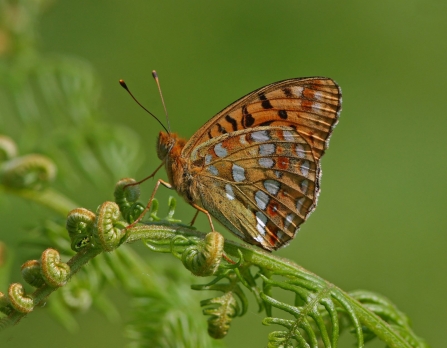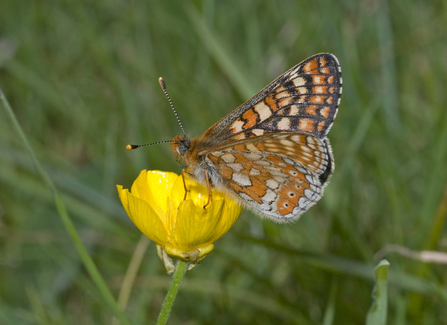Devon's Fabulous Fritillaries

Amy Lewis
Over the next 18 months, Devon Wildlife Trust has an opportunity to increase prime habitat for some of our most threatened butterflies – and set up what’s needed to maintain those habitats for at least the next 20 years – but we need your help today.
Butterflies like the pearl-bordered fritillary and marsh fritillary have been lost from much of the English landscape in the last half-century.
Devon is a vital stronghold for these species, thanks to conservation efforts on nature reserves and work with local farmers.
If these butterflies can’t thrive in Devon, then their future in the UK looks bleak.

High brown fritillary butterfly. Photo, Chris Root
There is clear evidence on how habitats can be managed to benefit different fritillary species and this has been demonstrated on DWT nature reserves.
But because management of bracken on steep slopes and cutting of rush and scrub on wet grasslands using hand-held kit is extremely time-consuming, we have never before been able to create the maximum possible area of habitat for fritillary butterflies.
Now though, DWT’s Devon Fritillary Recovery Project can use new machinery and additional staff and volunteer support to bring back more of these rare butterflies to Devon. But we need to raise at least £24,000 from this appeal to complete this exciting project.
Support Devon's rare butterflies today
We know exactly how to increase numbers of fritillary butterflies. With your donation, Devon Wildlife Trust will be able to:
• Dedicate more staff time across 12 of our nature reserves to restore and create the right habitat for some of our rarest butterflies to thrive
• Access new machinery to manage bracken, rush and scrub on steep slopes, wet mires and other terrain that is difficult to access on foot with hand-held tools.
• Train volunteers to carry out butterfly surveys for the four target fritillary species for many years to come.
Small pearl-bordered fritillary. Photo, Andrew Taylor
DWT already has a quarter century of experience of improving habitats to increase numbers of pearl-bordered, small pearl-bordered, high brown and marsh fritillary butterflies. Our work has been recognised and we have been able to secure funding to purchase machinery to help manage land more widely and more cost-effectively.
With your support, DWT staff and volunteers can restore more than 120 hectares (300 acres) of additional habitat for four stunning butterfly species – and lots of other wildlife that will benefit from this work - on 12 very special nature reserves.
A donation – of any size – will support the recovery of some of Devon’s rarest butterflies: thank you.
Support Devon's rare butterflies today
Statistics for fritillary butterflies tell two stories: a tale of national declines in the face of habitat loss and changes in how land is managed. But also, how targeted conservation work can see astonishing success stories for some of our rarest species.
High brown fritillaries have been lost from 82% of the British sites where they were recorded half a century ago – but populations have increased in recent years on some DWT Dartmoor nature reserves, through suitable management.

Marsland, on the Atlantic coast, displays best how fritillaries can be helped. Here, an astounding increase in small pearl-bordered fritillaries of 1,636% between 1988 and 2010 (at a time of continuing national declines) was achieved by a meticulous routine of bracken cutting in different areas.
But the new Devon Fritillary Recovery Project is the first time we will have the right machinery and additional staff time to improve habitats for these butterflies in increased areas, on more sites, more efficiently: so every pound we spend means greater benefits for wildlife.
Increasing land suitable for these butterflies’ larval food plants - dog violet and Devil’s-bit scabious - will benefit other threatened
species, including lesser butterfly orchids, narrow-bordered bee hawkmoths and Dartford warblers.
Volunteers trained in fritillary butterfly surveying will be active for years. So, your donation will help us know where interventions are working, and when to amend management.
This 18-month project’s new machinery should last for at least 20 years. So. with your support for this appeal, DWT can ensure prime habitat for some of Devon’s most threatened butterflies on a dozen nature reserves well into the future.
A donation – of any size – can help us reach the £24,000 target.
Help Devon's rare butterflies today
‘Flowers that fly’ – focus on four fritillaries
American poet Robert Frost described butterflies as “flowers that fly – and all but sing”. Your donation will support conservation work focused on the needs of four fritillary species, whose dazzlingly colourful wings play key notes in the song of a Devon spring and summer.
Pearl-bordered and small pearl-bordered fritillary
These woodland butterflies plummeted in numbers in the 20th century. Why? Because their life cycle requires just the right mix of
light and shade at different times of year for egg-laying and for their caterpillars to feed on violets.
Originally evolving in woods where large mammals created that light and shade mix, the same conditions were maintained for
centuries by human coppicing of woods for timber and cutting of bracken for a variety of uses. When this activity stopped, the butterflies lost their habitat and now need targeted land management to thrive.
Your donation will support this work on DWT nature reserves across Devon.

Marsh fritillary
Found in wet grasslands, this species makes a home on several DWT nature reserves, both in northern Devon’s Culm grasslands
and on Dartmoor, at Emsworthy Mire.
For its larval food plant, Devil’s-bit scabious, to grow in abundance, rotational cutting of scrub and rush is required, exactly what your
donation will allow DWT to do in wetter and more remote parts of these reserves.

High brown fritillary. Photo, Chris Root
High brown fritillary
Another butterfly whose caterpillars feed on violets, the same bracken management can also drive recovery of this species. It suffered huge nationwide declines between 1978 and 2022, the population dropping by two-thirds.
With your support we can ensure prime habitat for high brown fritillaries at DWT’s Dartmoor sites, Dunsford, Blackadon and Dart Valley.
The birds and the beetles - your donation will help lots of threatened wildlife
The habitat management work to be carried out on 12 DWT nature reserves, with your support, will not only benefit these four fritillary butterfly species.

We should see increases of other wildlife including tree pipits, nightjars and Kugelann’s green clock beetles on Dartmoor and grasshopper warblers, lesser butterfly orchids and keeled skimmer dragonflies on wet grassland sites.
Help Devon's rare butterflies - and lots of other wildlife - on 12 DWT nature reserves
Thank you!
Find out more about the Devon Fritillary Recovery Project
